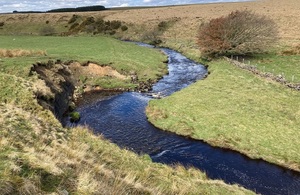Press release
The Environment Agency has worked together with partners to invest almost £3m in environmental improvements in the North East over the past year.

The Tipalt Burn
More than 21 hectares of habitat has been created or improved in the North East over the past year as part of a £3million programme of work to improve the environment for people and wildlife.
Almost 12km of river has been improved and more than 8,000 trees planted, while 32 hectares of stillwaters have been enhanced for fishing.
The North East Environment Programme is managed and delivered by the Environment Agency working mainly in partnership with government backed Catchment Partnerships, bringing together river and wildlife trusts, local authorities and other organisations to improve the environment.
There were almost 50 partners involved in this year’s £3million programme, contributing £461,000 in funding.
Key projects progressed in 2021/22 include:
- Blyth Estuary Habitat Enhancement – 27 habitat areas for wildlife created at Port of Blyth to boost the ecology of the estuary
- The EU Life Wader project led by Natural England will see the Environment Agency deliver restoration work on the Rivers Till and Breamish
- The Wilds of Wanney project aimed at improving water quality in the Upper Wansbeck tributaries delivered 1.4km of protection to the Delf Burn and supported the restoration of 4.5ha of habitat
- The Northumberland Crayfish Strategy continued its work to protect the endangered white clawed crayfish with the development of safe breeding ‘Ark’ sites, a captive breeding programme and an increased public awareness programme.
- Design and installation of a floating ecosystem on the Tyne Estuary at Newcastle Quayside – the first of its kind on a tidal waterbody – as part of the Tyne Estuary Habitat Enhancement project.
- Progressing a Tipalt Burn project to identify priority projects that will improve water quality in the burn, including tree planting, reducing run-off from land into the water and habitat creation.
- Gaunless Reconnected saw interventions at farms to reduce pollution running off farmland and into the river, including cattle crossings, improvements to farm yards and gates. It saw 2,700 trees planted, fencing installed and 300m of riverbank restored.
- Wear Estuary Improvements saw the creation of a 150m2 of saltmarsh along the River Wear Estuary – important habitat for marine animals and birds.
- Fish for Tees, aimed at improving fish passage at five sites and opening up 76km of river for fish migration made progress at all sites, with design and delivery the next steps.
- At Billingham Beck, options were developed for improving fish passage and creating and improving habitat.
Fiona Morris Environment Planning and Engagement Manager for the Environment Agency in the North East, said:
There’s been a huge variety and scale of projects in this year’s programme that have been started and delivered, from protecting iconic species, enhancing and creating habitat and improving water quality.
Together with our partners we are committed to driving forward innovative environmental improvements and continuing to deliver this ambitious programme of environmental improvements for people and wildlife in the North East.
Published 31 August 2022
Follow this news feed: HM Government





